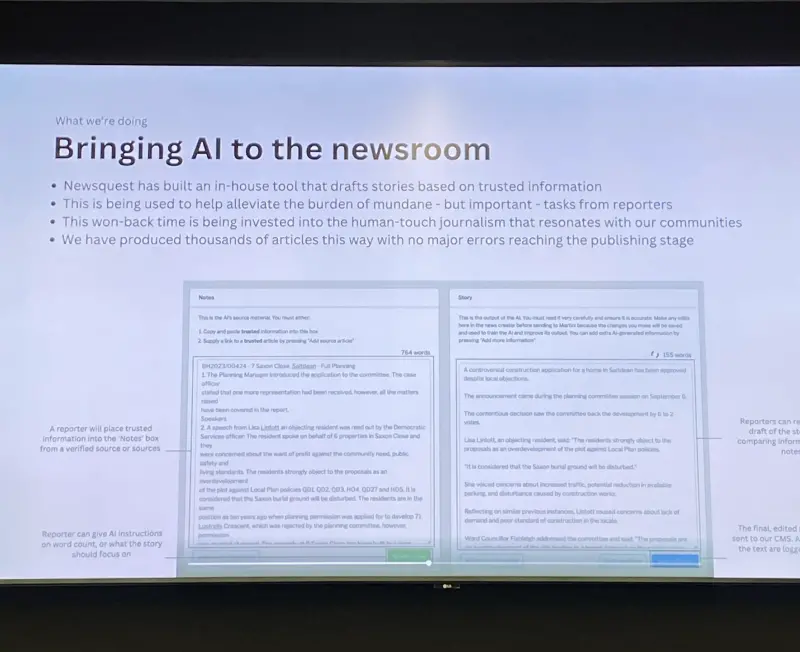
Regional publishing giant Newsquest now employs 36 “AI-assisted” reporters across its titles, its editorial development director has said.
Toby Granville revealed the figure, up from seven at the end of 2023, while speaking at the Society of Editors Media Freedom conference in London.
The reporters use an AI-powered CMS (see below) to rewrite press releases into stories, and are tasked with checking the facts and quotes are correct in the output.

Granville connected the AI-assisted reporters directly to Newsquest’s efforts to build loyal local audiences, saying their work “frees up the rest of the newsroom to actually be out pounding the beat, knocking on doors, getting original content that people are willing to pay for”.
He added the AI-assisted reporters helped because “we’ve got a lot more space to fill in those newspapers now, because there’s not many adverts in them”.
Although the print audience is declining, Granville said: “We’ve managed to slow down decline by focusing on better front pages, higher local story counts, news that’s actually relevant to the old readers…
“We know that that audience is dying, but we’ve managed to add probably five or six more years to the print products, at least, having gone from around minus 16% [a year] to minus 10% on our newspaper sales.”
The “biggest thing” Newsquest had done to maintain a local audience connection, he said, was keeping open its 50 or so newsrooms in town centres around the UK. The AI-assisted reporters are also embedded in local newsrooms.
Asked how AI-assisted reporters can progress professionally given they’re not doing traditional beat reporting, Granville told Press Gazette that they “choose to do this kind of AI-assisted work because they prefer it to traditional reporting.
“As far as progression is concerned, firstly, half a day a week they have training in AI literacy, learning how to build new AI tools, and hearing from industry experts. Many AI-assisted reporters are teamed up to brainstorm new ideas for using AI for journalism and some excellent initiatives have come from those developments that are rolled out in our newsrooms for AI and non-AI journalists.
“Separately, there are opportunities to be appointed the AI Champion for their region and oversee the progress and development of their AI-assisted reporters and we have also appointed two of the AI-assisted reporters to work in more senior AI development roles under Jody Doherty-Cove our Head of AI.
“The AI-assisted reporters can also return to being a traditional reporter and complete their training and progress in line with the rest of our journalists if they wish.”
Newsroom leaders at Times, Sun and Guardian warn of risk to publishers from ‘disintermediation’ and ‘non-canonical news’
At another session at the conference, Times and Sunday Times head of digital Edward Roussel asked the audience if anyone used ChatGPT to get their news that morning, to little reaction from the crowd.
“But it’s coming, right?,” he said. “If you just enter a search into ChatGPT, on any type of news query, the results are getting better and better. And so at least one very substantial risk for publishing companies is that ultimately you get disintermediated from that relationship with your reader.”
Similarweb data from January suggested that publisher referral traffic from ChatGPT had increased significantly over the previous six months, but remained tiny as an overall proportion of top news outlets’ referral traffic.
Roussel said The Times titles had tried to stave off the risk of readers accessing its journalism through chatbots by building a loyal direct audience.
“What we observe is that for readers who come ten plus times in the course of a month to our app, the propensity to churn [unsubscribe or fail to resubscribe] falls off a cliff… the more that we can encourage them to come back, the more likely they are to hang around with us and to enjoy our journalism.”
As well as the journalism product itself, Roussel said, the brands encouraged readers onto its platforms through “greater community elements, great commenting experiences… or additional tools like puzzles and games”.
At the same session Chris Moran, the head of editorial innovation at The Guardian, said he was not sure about newsrooms using AI “to effectively create endless, personalised versions of what we are producing… is that actually our purpose?”
He connected this question to the AI-driven personalisation and summarisation he thought was likely to occur in future on users’ individual smartphones and web browsers.
“Android phones and Apple phones are going to be serving people summaries first thing in the morning before too long… I think we have a lot of work to do to make the case to people about why we matter and why we are distinct from a synthetic piece of content that is not checked by a human and that, interestingly, as well, is not canonical.”
Moran elaborated on the idea of “canonical” news by citing a well-publicised incident in which an Apple Intelligence summary of a BBC News headline told a user that Luigi Mangione, the man accused of shooting health insurance boss Brian Thomspon, had shot himself.
Moran said: “We’re moving into an area where everybody can agree what The Guardian or The Times or The Sun has published, and we can be held accountable to it, into an era where only you are seeing what this thing is telling you, and it might be wrong. And there isn’t any accountability…
“Not only no accountability, but because it is endlessly personalisable you can’t even see it. And I think we have to start having a conversation about what the damage that can do to the public is – not just us. But it can be a difficult kind of position to push because it’s very easy to be identified as a Luddite.”
He said AI was “something we absolutely have to be on top of. We have to identify where we can use them to help all of our journalists to do their work better and more efficiently, and so on.
“But I don’t think the only response to this threat is to adopt AI.”
Nadine Forshaw, the editorial innovation lead at The Sun, said she thought these flaws in AI news summarisation would ultimately influence user appetite.
“At some point, over time, that habit is going to shift,” she said. “Because the public aren’t stupid. They are going to consume news on these platforms, and then at some point, they’re going to get burned. They’re going to read something that wasn’t true and they’re going to lose some faith.
“And that’s when we need to be there for them to come to us directly and be that authority on these topics.”
Email pged@pressgazette.co.uk to point out mistakes, provide story tips or send in a letter for publication on our "Letters Page" blog
